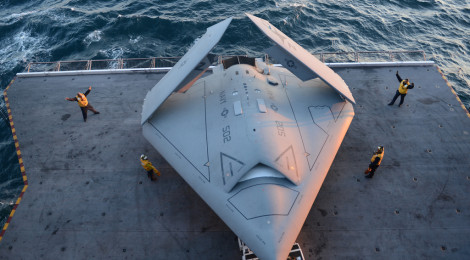Grounded: What the UCLASS RFP Fight Really Means
http://warontherocks.com/2014/05/grounded-what-the-uclass-rfp-fight-really-means/

Grounded: What the UCLASS RFP Fight Really Means
Andrew Metrick
May 19, 2014 · in Analysis
Since the historic series of tests of its X-47B Unmanned Combat Air System-Demonstrator (UCAS-D) on the USS George H.W. Bush last summer, the Navy has reached an inflection point on the future of unmanned carrier aviation. Specifically, the request for proposals (RFP) for the Unmanned Carrier Launched Airborne Surveillance and Strike (UCLASS) aircraft is delayed and the draft has only recently been released in a restricted form. The delay is due to a battle over the UCLASS requirements and whether the platform should resemble a high-end, penetrating aircraft, or a more limited ISR platform suited for low threat environments. The Navy is widely reported to have chosen the latter course; issuing a request for proposals for a “low-end” UCLASS.
This decision has drawn considerable ire from outside groups. Notably, Shawn Brimley recently penned an op-ed in which he chastised the Navy for its “poor judgment” in favoring a more affordable, non-penetrating aircraft. Rep. Randy Forbes, the Chairman of the Seapower and Projection Forces Subcommittee of the House Armed Services Committee has taken notice. He inserted language into his subcommittee’s markup of the 2015 NDAA that would require the secretary of defense to certify the UCLASS requirement before the program is allowed to move forward. He believes that the Navy is not correctly emphasizing the strike mission in its current request for proposals; a nod to those who favor a more “capable” penetrating aircraft. In addition, the full House Armed Services Committee markup cuts UCLASS funding in half as part of a program delay pushed by Rep. Forbes.
The Navy decision is at odds with statements of Navy leaders such as Secretary Ray Mabus, who as recently as January argued that the Navy needs a UCLASS platform able to operate in contested environments (in other words, where other things might shoot at it). Interestingly, the newly minted Deputy Secretary of Defense, Robert Work previously helped define the high-end UCLASS (then the Naval Unmanned Combat Air System or N-UCAS) requirement during his tenure with the Center for Strategic and Budgetary Assessment and later as undersecretary of the Navy.
The UCLASS delays are hampering experimentation and slowing down the integration of a key future technology into the carrier air wing. Additionally, the decision seems contrary to the Navy’s seeming commitment to cutting edge technology for future warfare. However, outside experts such as Mr. Brimley, Bryan McGrath, and Mark Gunzinger who extoll the need for high-end, penetrating platforms may be overlooking a broad range of military operations
